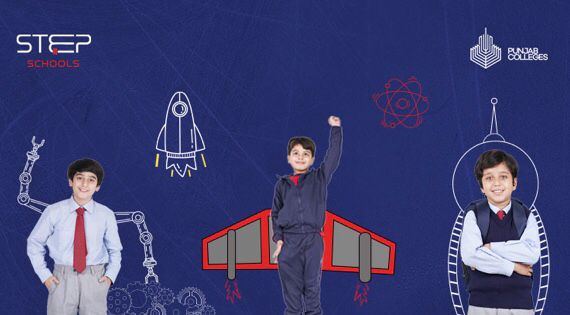McKinsey Global Institute has forecasted that demand for higher skills such as decision making, critical thinking, complex information process, and creativity will grow by 19% by 2030. If anything, this forecast translates into the fact that future careers will be way more challenging than the present ones. Why? Because the same will require cross-marketability skills and interdisciplinary knowledge. This is where STEP Schools steps in as it imparts 21st-century knowledge through the STEAM approach.
STEP Schools is part of the Punjab Group of Colleges, a name synonymous with educational excellence in Pakistan. The brains behind STEP Schools realized that the traditional methods of teaching relying on rote memorization and repetitive classroom lectures do not cater to the needs of an increasingly complex and tech-driven world. So, they designed a 21st-century curriculum driven by 4Cs (critical thinking, communication, collaboration, and creativity) and incorporated the STEAM approach into it.
STEAM
The 21st-century method deployed by STEP Schools opts for a multi-dimensional approach to the student’s learning experiences both in and out of the classrooms. STEP Schools’ 4C-driven curriculum shifts focus on developing and fostering analytical, decision-making, critical, and creativity skills in children from an early age. Likewise, project-based learning increases students’ engagement and offers special attention to each student in the class.
The core of 21st-century learning is the notion that learning is a lifelong process.

Broad & Flexible Teaching Strategies
At STEP Schools, our teachers deploy a wide array of broad and flexible strategies vis-a-vis the needs of the students and the context of the situation. These strategies champion interdisciplinary & hands-on learning and student engagement over conferring information. At STEP Schools, teaching methodologies and approaches are based on inquiry, focused on conceptual understanding, and developed in local and global contexts; likewise, the same is informed by assessments and is designed to remove barriers to learning.
In STEP Schools’ 21st-century classrooms, educators are not just teachers. They are relationship builders, innovators, leaders, storytellers, designers, and artists.
Project-based Learning
At STEP Schools, Project-Based Learning (PBL) forms the core of our philosophy that steers students’ learning in a meaningful manner that reflects their interests and the needs of modern times.
PBL nurtures and fosters thinking, research, social, self-management, and communication skills – a holistic development that is imperative for the 21st-century workforce. PBL aims to empower learners to see learning as a dynamic and active process.

21st-century Classrooms
STEP Schools provide students with exposure to 21st-century classrooms. The classroom’s environment is designed to promote student-led and inquiry-based teaching and learning that ultimately leads to the wholesome development of students. Likewise, highly-experienced and qualified faculty creates an environment that sparks curiosity, encourages & empowers students’ communication, collaboration, and participation while supporting each student’s personal journey.
Likewise, each campus has a ‘Resource Room’ equipped with LEDs, multimedia, interactive whiteboards, sound systems, and other pieces of equipment. These resource rooms provide the most up-to-date education to children.
Technology-Enhanced Learning
STEP Schools employs technology-enhanced learning (TEL) to meet four main concepts: citizen science, mobile learning, openness, and learning at scale. TEL fosters students’ ability to engage with multiple texts in multiple modes of literacy; the same helps educators replace old teaching habits while sustaining the contemporary ones. It also helps both students and teachers to enhance. By incorporating technology in learning practices, it is ensured at STEP Schools that existing processes are carried out in a more time-effective and sustainable manner. It also improves outcomes of existing processes while introducing new practices at the same time.
Keeping aforesaid notions in mind, STEP Schools has developed platforms of:
- STEP Portal
- STEP E-learning program
- STEP ICT curriculum
The purpose of educational technology at STEP Schools is to groom the students as creators and makers of tomorrow’s technology and innovation.

Admissions Open
If you want to get your child exposure to 21st-century learning, register with our perspective school within your city to gain an advantage over your child’s future from an early age.
STEP Schools offer admissions to the junior school classes and middle classes as of now. But, the student already on enrolment will have an opportunity to complete the school education from Step 1 to Step 10.
STEP Schools offers:
- 21st Century learning with standardized curriculum and booklist
- Scholarships, financial aid, and Indemnity (Educational insurance)
- Sibling discount
- Inter-school student transfer facility
- Interactive learning environment along with smart education tools in classrooms
- Emphasis on life skills
- The continuous assessment process to evaluate the performance of each student.
- Well optimized web portal to provide complete performance evaluation of students through dedicated portal IDs for the parents
- Ease of access for parents to their child’s record through STEP Schools Mobile App
- Regular intimation of attendance and other important notifications through SMS
- Regular co-curricular activities such as arts & crafts, physical education, games, inter-school competitions, educational trips, and sports events







